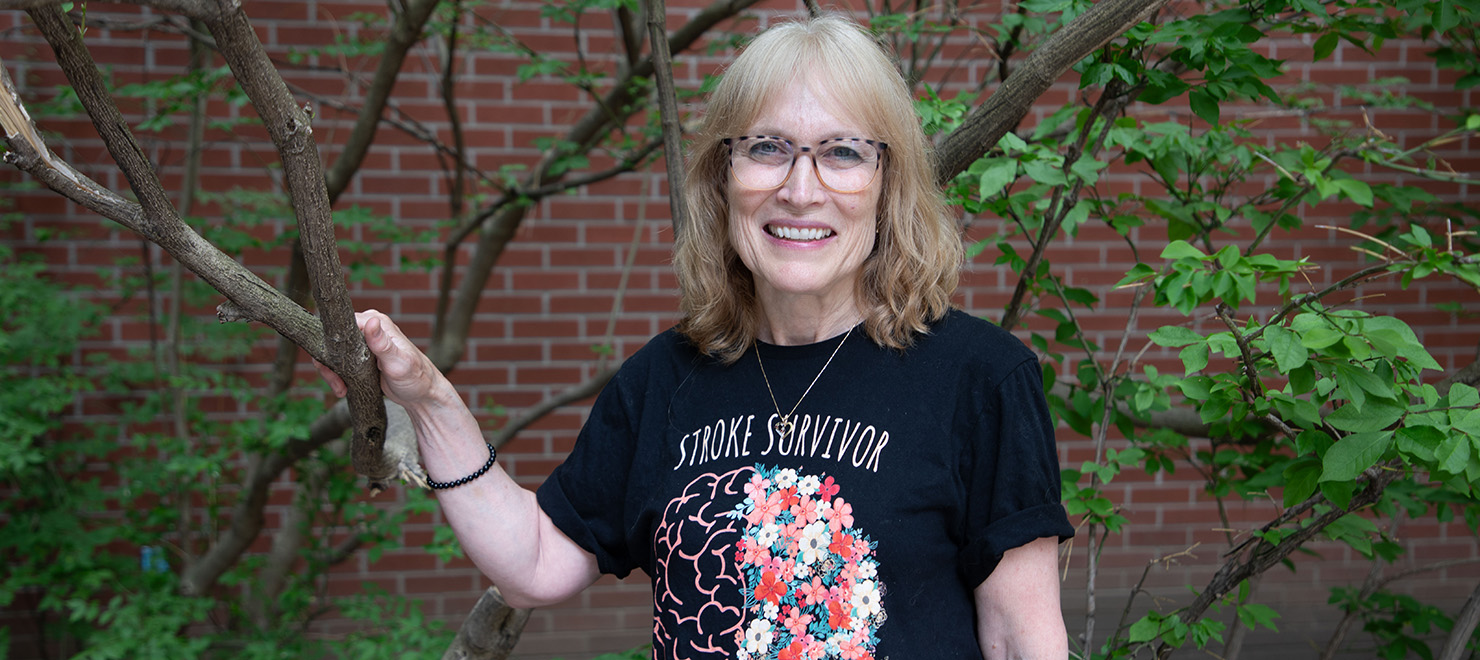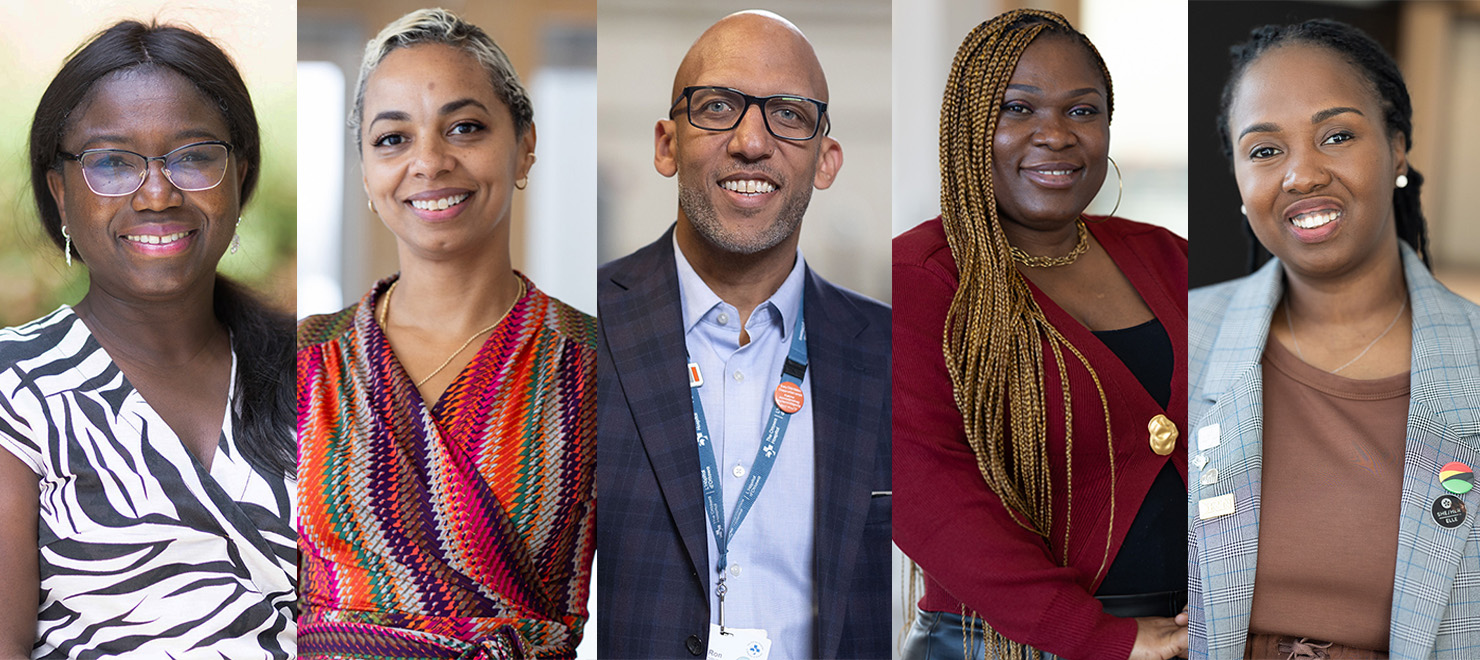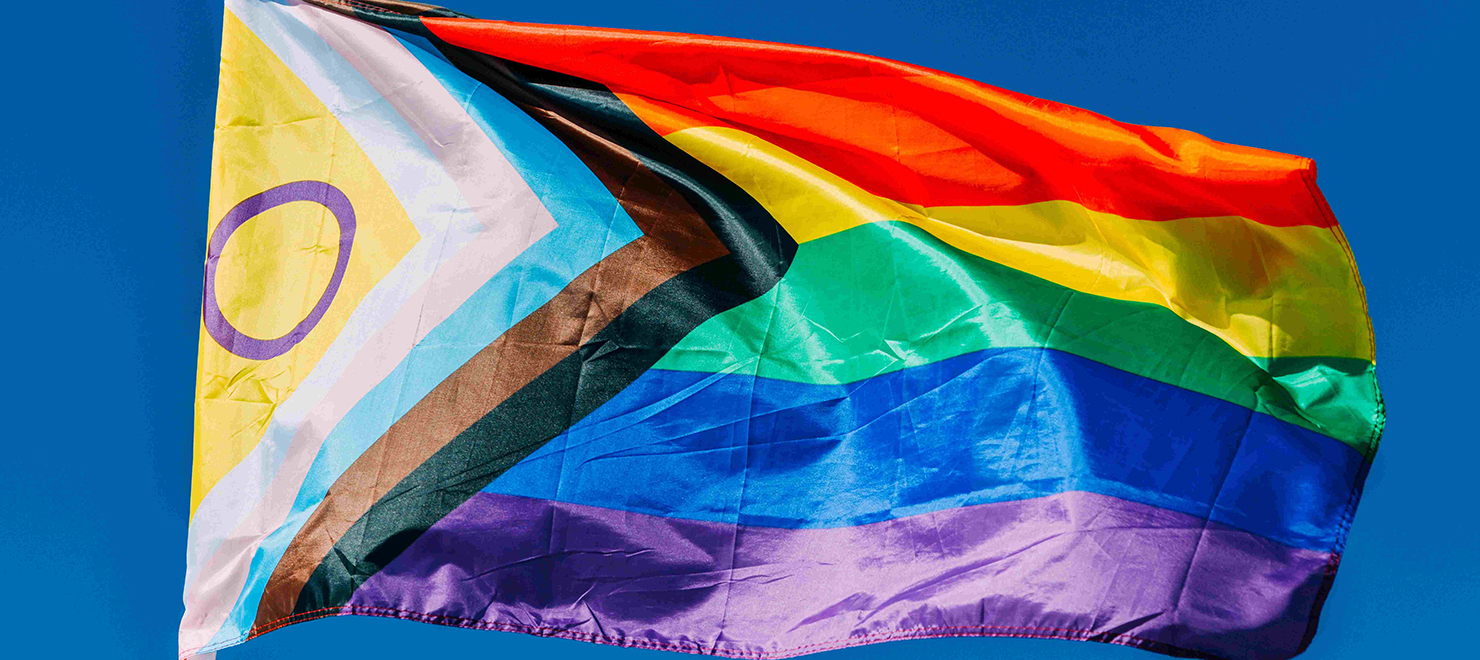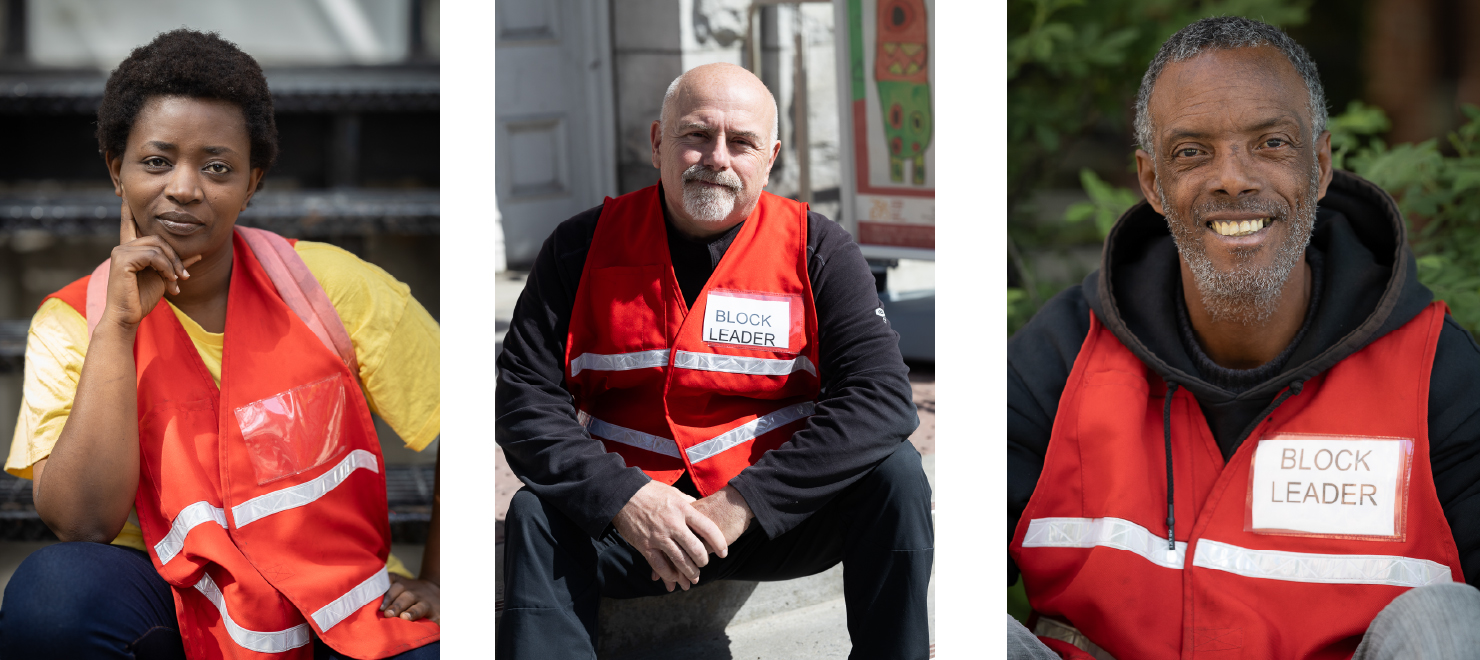
The Ottawa Hospital considers patients and their loved ones crucial partners in care, especially when it comes to creating safer and welcoming spaces.
Created two years ago, The Ottawa Hospital’s Rainbow Patient and Family Advisory Committee (Rainbow PFAC) has given a strong voice to the 2SLGBTQ+ community. 2SLGBTQ+ is an initialism that stands for two-spirited, lesbian, gay, bisexual, transgender and queer, with the plus representing other sexual identities. This community has historically faced severe systemic discrimination in the health-care system, and interactions with care providers can still be challenging.
Rainbow PFAC advisors collaborate with the hospital’s key decision makers to improve care for this vulnerable patient population, drawing on their lived experiences as both patients and family members.
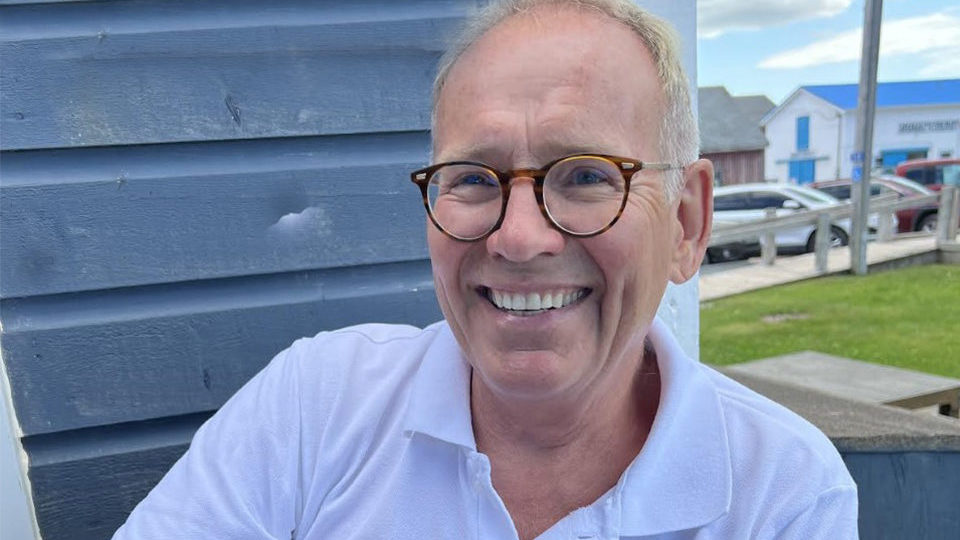
“Pride events and occasions are important, but we’re not just raising the flag for a week or two and that’s it for the year,” says Rainbow PFAC co-chair Tim Hutchinson. “The Rainbow PFAC is helping us to infuse pride into the hospital’s DNA.”
The Rainbow PFAC has spearheaded a number of initiatives to help achieve this. Here are just a few examples of their hard work in action.
Hospital-wide programming
Over the years, The Ottawa Hospital has launched an array of programs to enhance quality of care for the 2SLGBTQ+ community. These include nursing education sessions on gender diversity and trans health, as well as workshops where patients are taught storytelling techniques so they can improve communication with their care providers.
The success of these education programs and workshops were actually the genesis of our Rainbow PFAC.
“With the popularity of these programs, it became apparent that the unique 2SLGBTQ+ patient experience needed to be better integrated into the care provided at The Ottawa Hospital,” says Tim. “Responding to this need, the idea of a distinct PFAC group was proposed.”
Creating a safe space in our emergency department
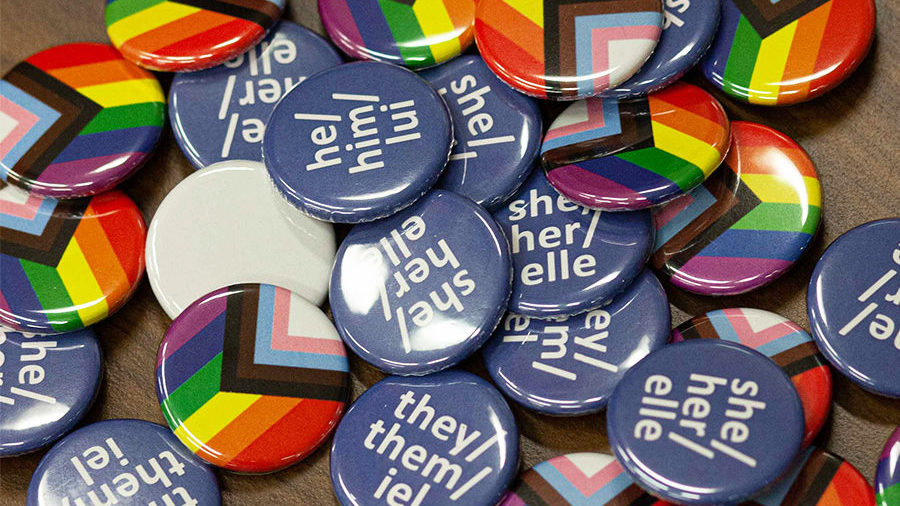
For many patients, their health-care journey begins in the emergency department. That’s why the Rainbow PFAC has been working very closely with our admitting and emergency registration team.
The Rainbow PFAC co-designed a gender diversity training module for admitting and emergency registration staff. Titled “Respectful Conversations with Gender Diverse Patients,” the module outlines how to ask for and document a patient’s gender identity and pronouns.
As a standard procedure, staff now ask patients for their gender identity, pronouns and chosen name at registration. Patients can also update their own gender identity and chosen name in myChart, our online patient portal. And when you visit the hospital, you will see many of our admitting and emergency registration staff wearing buttons featuring their own pronouns.
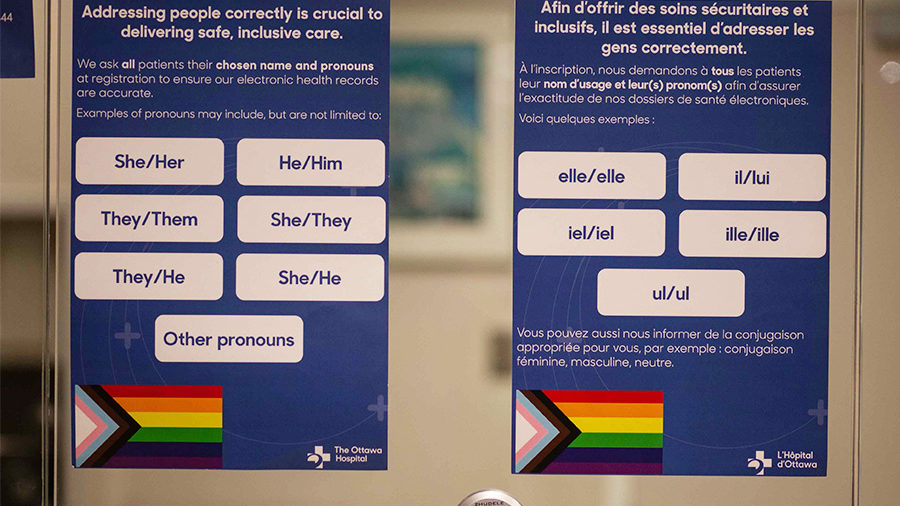
Respecting Gender Diversity staff training module
Recently, the PFAC co-designed a more in-depth gender diversity training module that has just been rolled out to all hospital staff members. This new course offers even more guidance for our staff on how to create a safer space for our trans and non-binary patients.
The visibility and success of this course, as well as the Rainbow PFAC’s other initiatives, have sparked interest from many departments in the hospital which are now looking for advice and further training to enhance patient care.
“Over the past two years, we’ve built appetite and interest at the hospital,” says Tim. “It shows that we’ve generated a willingness to really think about care delivery differently. That’s been very rewarding to me.”
Preparing for the future
“I’m really proud that we’ve accomplished a lot in two years, especially in a pandemic,” says Tim. “But there’s still a lot of work to be done.”
The Rainbow PFAC has several projects on the horizon, such as expanding much-needed mental health services, improving hospital discharge planning for 2SLGBTQ+ seniors, and collaborating with the Cancer PFAC to expand screenings for cancers that are more prevalent in the queer community.
Additional resources
- Gender Diversity in Health Care: Moderated by Rainbow PFAC member Karen Luyendyk, this episode of The Ottawa Hospital’s Healthy Conversations podcast series features three staff members, who identify as trans and non-binary, sharing their experiences living and working in a cisnormative society.
- A guide to personal pronouns: Transgender staff and Rainbow PFAC members answer frequently asked questions about personal pronouns and explain how to use them respectfully.
- Young Trans Girl Speaks with an Older Trans Woman: This video from the My Genderation film project is featured in both of our gender diversity training modules.

Support patient care and research at
The Ottawa Hospital
You might also like…
From survivor to supporter: Peer volunteers bring hope to patients recovering from stroke
Drawing on their own lived experiences as stroke survivors or caregivers, volunteers with March of Dimes Canada’s After Stroke Hospital Peer Connections program offer emotional support to those just beginning their recovery journey. Discover the difference they’re making and learn about how you can request support for a loved one — or become a beacon of hope yourself.
Sign language interpretation services at The Ottawa Hospital: 5 FAQs
Do you require a sign language interpreter when you come to The Ottawa Hospital? For patients who are Deaf or hard of hearing, we provide both American Sign Language (ASL) and Langue des Signes Québécoise (LSQ) interpretation services at no cost. Before your next appointment with us, find out everything you need to know.
February is Black History Month
Five members of The Ottawa Hospital’s Black community reflect on what this month means to them, their heritage and the importance of building a truly equitable health care system.
The place to be: The Ottawa Hospital recognized as one of Canada’s most admired corporate cultures
The Ottawa Hospital (TOH) has been named one of Canada’s most admired corporate cultures. Guided by compassion and commitment to patient care, TOH has developed a workplace culture that inspires confidence and trust in our employees, patients and family members.
2SLGBTQIA+ care at The Ottawa Hospital: A helpful guide
The Ottawa Hospital offers an array of services and resources to help meet the specific care needs of the 2SLGBTQIA+ community — including a provincial-first gender-affirming surgery clinic, a 24/7 care program for survivors of sexual assault and intimate partner violence, and a specialty clinic for medically complex patients seeking help on their transition journeys.
“It’s about giving them hope and purpose”: Ottawa Inner City Health’s Block Leaders program marks one year serving the community
Seven days a week, Block Leaders head out into the ByWard Market to help fellow members of their community who are unhoused or use drugs. They provide support to people in distress, respond to overdoses and even clean their neighbourhood — all with the goal of creating a safer and healthier community for everyone.


 To reset, hold the Ctrl key, then press 0.
To reset, hold the Ctrl key, then press 0.
